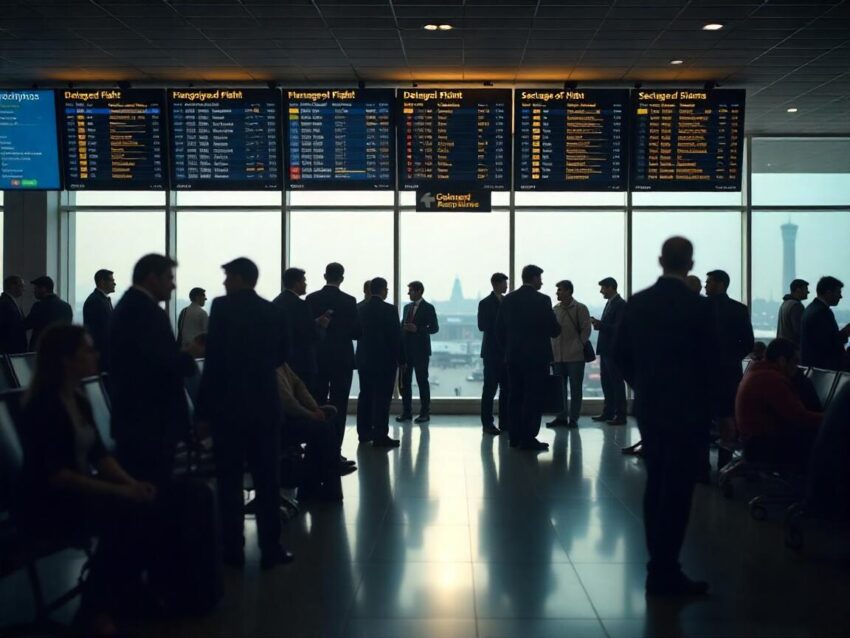Flight Interruptions in UAE, Saudi Arabia, Qatar and more Disrupts Travel across Al Maktoum, King Abdulaziz, Hamad International and other Middle Eastern Airports, New Update
Flight disruptions in UAE, Saudi Arabia, Qatar and more impact travel at Al Maktoum, King Abdulaziz, Hamad International and other Middle Eastern airports.
Flight disruptions in the UAE, Saudi Arabia, Qatar and other Middle Eastern countries have significantly impacted travel across major airports. Several major airports have reported numerous flight cancellations and delays today. Al Maktoum International, Dubai International, Sharjah International, King Abdulaziz International, King Fahd International, Hamad International, Kuwait International, Cairo International and Sharm El Sheikh International airports are all impacted. These disruptions have affected both passenger comfort and travel schedules, leaving many passengers in limbo.
Major Airports Affected
At Al Maktoum International, located in Dubai, 3 flights have been cancelled, with 10 other flights facing delays. Dubai International, one of the busiest airports globally, has experienced an even greater strain, with 9 cancellations and 136 delays. Sharjah International has seen 4 cancellations and 22 delays. Further down the coast, King Abdulaziz International in Jeddah, Saudi Arabia, has had 9 cancellations and 60 delayed flights, while King Fahd International in Dammam reported 4 cancellations and 25 delays. Moving to Hamad International in Doha, Qatar, 5 flights have been cancelled and 72 other flights have been delayed. Kuwait International in Kuwait has had a relatively lighter impact with only 1 cancelled flight and 30 delayed flights. Cairo International has faced 1 cancellation and 93 delays and finally, Sharm El Sheikh International has had 1 flight cancellation and 16 delays, adding to the travel chaos in the region.
Affected Cities and Countries
This wave of disruptions spans multiple cities and countries, affecting travelers across a wide geographical area. Airports in the United Arab Emirates (UAE), Saudi Arabia, Qatar, Kuwait, Egypt and the Palestinian Territories are all experiencing disruptions. In the UAE, Dubai, Sharjah and Al Maktoum airports have been particularly impacted, with passengers bound for or from destinations like India, Pakistan and European cities facing significant delays.
In Saudi Arabia, cities like Jeddah and Dammam have experienced heightened disruptions, causing problems for travelers to and from destinations within the Middle East and beyond. Qatar’s Doha remains heavily impacted, with delays affecting flights to Asia, Africa and other destinations in the Middle East.
Meanwhile, Cairo and Sharm El Sheikh, two of Egypt’s busiest hubs, have seen their share of travel woes today, causing issues for passengers traveling from Egypt to regional and international destinations. Passengers from Kuwait have also been affected, as Kuwait International handles crucial flights to neighboring countries and beyond. With so many airports in these key countries affected, travelers across the Middle East are facing challenges on a large scale.
Impacted Airlines
A wide range of airlines have been affected by the disruptions at these airports. At Al Maktoum International, airlines such as Royal Jordanian, Cargolux Airlines International and Flynas have seen cancellations and delays, with Flynas being one of the region’s most prominent low-cost carriers. At Dubai International, major airlines like SpiceJet, Airblue and Lufthansa are part of the list of impacted carriers, while at Sharjah International, Air Arabia, Airblue and Air India Express have experienced significant delays and cancellations.
Saudi Arabia’s Saudia, along with Akasa Air and Air India, is affected at King Abdulaziz International, while Saudia, Cargolux Airlines International and Lufthansa have been impacted at King Fahd International in Dammam. Air Arabia, Georgian Airways and Air India are the airlines most affected at Hamad International, while SriLankan Airlines, Air Arabia Abu Dhabi and Saudia have been impacted at Kuwait International.
Meanwhile, Air Cairo, Air Arabia and Aegean Airlines have had their operations disrupted at Cairo International and easyJet and Egypt Air are among the affected airlines at Sharm El Sheikh International.
What Affected Passengers Can Do Now
For passengers facing delays or cancellations at the affected airports in the Middle East, it is important to remain informed and take necessary steps to minimize the disruption to their travel plans. First and foremost, travelers should stay in close communication with their respective airlines to receive real-time updates on the status of their flights. Airline representatives can provide information on alternative flight options, rebooking procedures and compensation for affected passengers.
In case of cancellations or major delays, airlines are typically required to provide assistance, such as meal vouchers, hotel accommodations, or even full refunds depending on the circumstances. Passengers should keep all receipts and documents related to their disrupted travel, as these may be required for reimbursement claims. Many airlines also offer online tools for managing bookings and tracking flight status, so passengers are advised to use these resources for quick updates.
Additionally, travelers are encouraged to plan for potential delays by arranging flexible accommodation options or considering alternative transportation options to their destination if necessary. Passengers should also be aware of any entry requirements, such as visas or COVID-19 regulations, which may change due to unforeseen delays.
With flights experiencing significant delays and cancellations at several key airports in the Middle East, it’s essential for passengers to stay proactive and prepared. By maintaining communication with airlines and utilizing available support options, travelers can manage the impact of these disruptions more effectively.
In conclusion, the air travel disruptions today at multiple Middle Eastern airports serve as a reminder of the unpredictable nature of air travel. While the immediate impact is felt by passengers trying to navigate the cancellation and delay chaos, there are steps that affected travelers can take to reduce the stress of the situation. As airports and airlines work to resolve the issues, staying informed and prepared remains the best course of action for passengers.
The post Flight Interruptions in UAE, Saudi Arabia, Qatar and more Disrupts Travel across Al Maktoum, King Abdulaziz, Hamad International and other Middle Eastern Airports, New Update appeared first on Travel and Tour World


Comments and Responses
Please login. Only community members can comment.